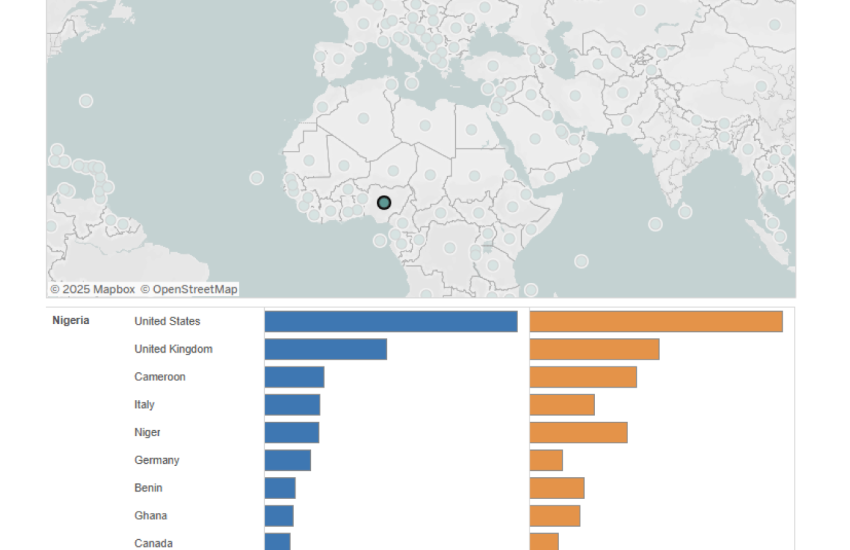Nigeria's Diaspora - sustaining the nation's flailing economy
The Diaspora has consistently been the backbone of Nigeria's fledgling economy held at ransom by corrupt and inept leadership across all tiers of government. As at July 2025, two years after the current APC government installed itself, the rot has festered more with insecurity and impoverishing conditions impaling the average Nigerian so much that people are living in desperation. For those with friends or family in the diaspora, they are often able to garner support in cash or kind as the need may arise. This channel of funds has been a critical source of stability and according to a writer, perhaps prevented the not so fortunate Nigerians from literarily eating each other!
As at 13th July 2025, @grok posited that;
"Nigerians in the diaspora remitted approximately $19.5 billion to Nigeria in 2023, according to the World Bank, representing about 35% of total remittance inflows to Sub-saharan Africa. This figure reflects a 2.9% decline from the previous year's $20 billion..... Projections suggest inflows could reach $26 billion in the coming years with policy reforms aimed at channelling funds through official markets"
According to Migration Policy Institute (MPI) tabulations of data published by the KNOMAD/World Bank Bilateral Matrix 2021/2022, the total inflow from the ten (10) listed countries to Nigeria during COVID was estimated as nearly $16 billion, with the US being major inflow source for approximately $5.7 billion, closely followed by the UK, providing about half that amount and Cameroun $1.4 billion. The import of this information is that since COVID inflow remittances to Nigeria has increased significantly and it is projected that this increase will continue to rise if Nigeria would for all its worth decide to appoint sensible leadership bereft of the blatant theft and mismanagement displayed by the so-called leadership.
Available data would indicate Nigerians emigrate, otherwise referred to as "Japa" - pronounced Jakpa; predominantly to other English speaking western countries such as the U.S, UK and Canada, Australia and perhaps New Zealand. They however also domicile in the West Africa subregions mainly Ghana, The Gambia, Togo and Cameroun. The previous decades' conflicts in Liberia and Sierra Leone significantly denuded the Nigerian population in those nations, but certainly for a short time. Due to the insecurity and banditory in the North and Middle-belt regions and with kidnapping and unchecked criminality in parts of the South and South East, Nigerians are willing to Japa to any foreign nation regardless of religion, culture or language barriers. Its therefore not surprising to find Nigerians in the "Far East" Indo-China countries or indeed in colder climes in Euro-Asia. With Nigeria's combined domestic and diasporan population being estimated to be between 230 - 235 million, and projected to increase to a quarter of a billion from 2050, one-in-five who may identify as a black African is most probably a Nigerian.
Regardless of their eventual foreign residence what is often notable is the pining for their homeland, a fact that maintains a drive to succeed, and perhaps support kith and kin back home. Whilst a number of emigrees may have resolved to make their new countries home, majority continue to identify as diasporan Nigerians, and would often support charitable causes if indeed convinced of the primary convener's altruistic motivation. Diasporan Nigerians detest what has become an endemic penchant for aggrandizement of public resources, as demonstrated by the self-selected president who, from day one, made it clear it was about himself and non-other.
As at 2025, Nigerians have no confidence in its present leaderhip. Perhaps the only light at the end of this tortous tunnel is the remote possibility of change in 2027, if, and only if, Peter Obi becomes the President of the Country. This might perhaps signal inclusion of the East who has hitherto, been marginalised, excluded and vilified for daring to challenge the status-quo in the dark days preceding the Nigerian civil war from 1966 to 1969. Yet Nigerians of predominant Eastern descent have been the hub and spoke of the economy, largely driving the import-export markets, manufacturing and industry. Nigerian diasporans from the East and South of the country, perhaps make up a significant proportion of all Nigerian diasporans and indeed contribute immensely to the inflow of remittance due to their involvement in trade and businesses in their domicile countries.
Conclusion
There is little doubt of the significant role the Nigerian Diaspora plays in cushioning the country from economic turbulence self-imposed by an inordinate leadership literarily propelling the nation in no clear direction. The country continues to feel it is in uncharted waters. But the reasons for this is obvious. Insecurity rather than abating, remains rife and expanding. Employability continues to decline whilst unemployment among the Nigerian youth is at its highest and increasing. Entrepreneurs and the private sector though doing their utmost, experience liquidity crises due to declining patronage compounded by escalating exchange rates. Many Nigerians seek to Japa, to join the diasporans in the hope of finding better prospects abroad. These trends perhaps contributes to the belief that Diasporan remittances will continue to increase over the next few years.
Although it is positive that such inflow exists as a buffer to an otherwise battered economy, the converse is that it has maintained an "all-is-well" appearance, protecting the nation from a truly failed state, where desperation might lead to anarchy and chaos. On the other hand, economic advantages of Diasporan remittances has not necessarily translated to political enfranchisement of this group. Though Nigerians in the diaspora has been active supporting causes towards effective governance and socio-political change, the machinery of government has strategically excluded this group from expressing their voice through the ballot. If he who pays the piper dictates the tune, it is perhaps clear that the authorities worry that the diasporan vote may indeed determine the outcome of these elections in as much as the majority of diasporans are likely to participate and express views that might preclude unsavoury characters from perenially remaining in office.
Regardless, making the most of resources Nigerians in the diaspora has to offer is critical for true sustainable development. Economic solvency is one true benefit of a successful diasporan population. It would be the ultimate win for the country if this also can be transferred into a socio-political emancipation of an otherwise captured state.
- Log in to post comments

